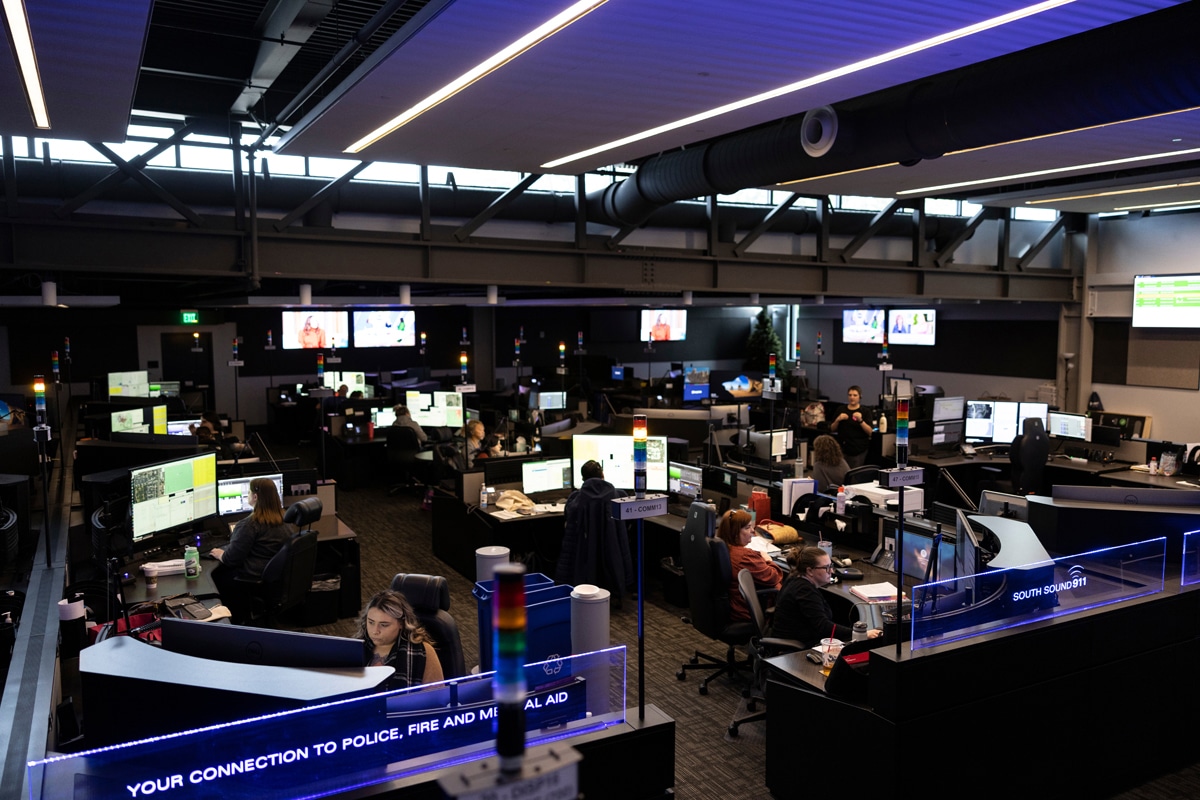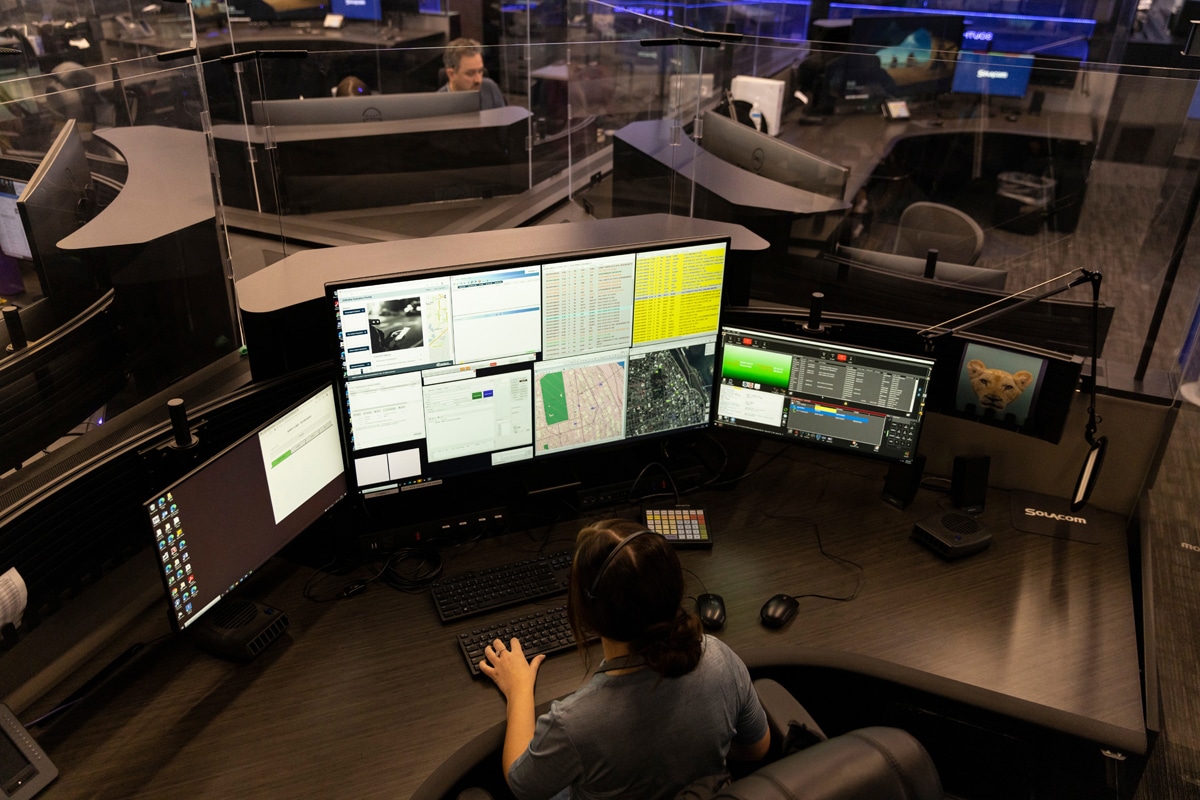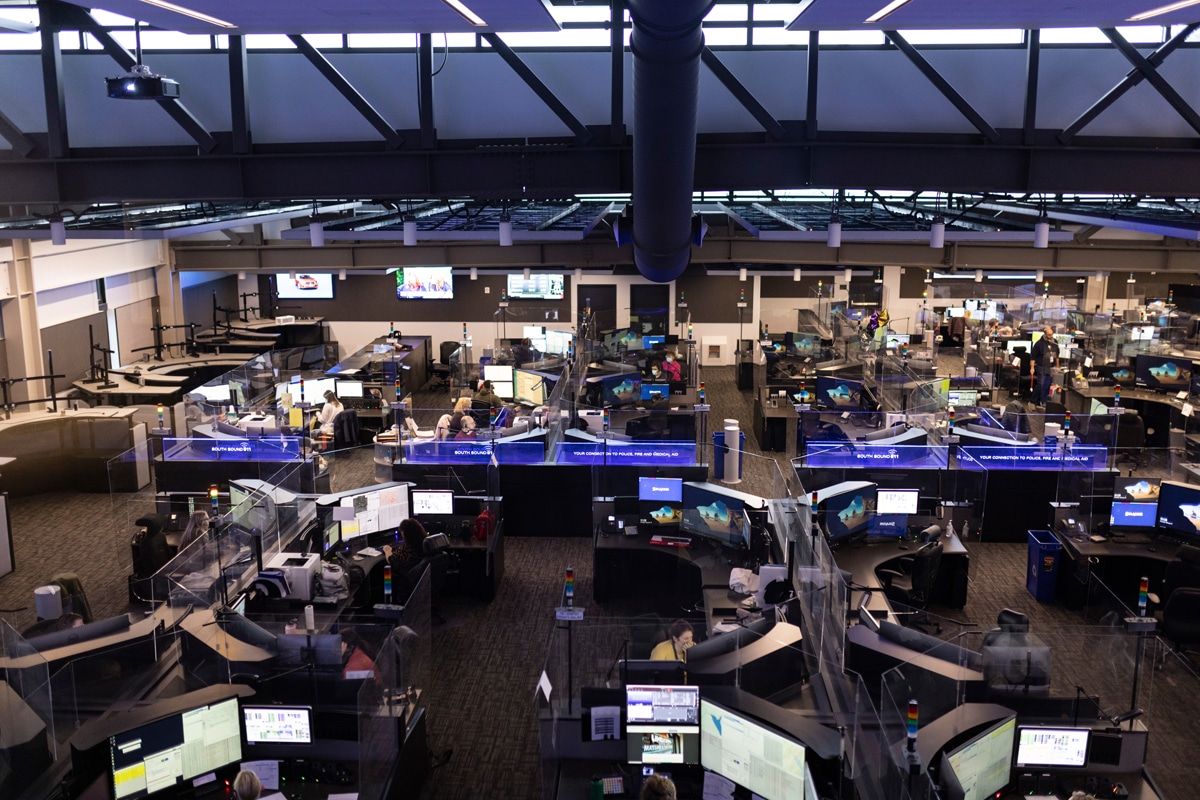Community Health & Wellness Police & Fire
911 meets 988 at emergency call center serving Gig Harbor area
As the largest 911 call center in Washington, a growing number of the nearly 1 million calls South Sound 911 handles annually involve someone experiencing a mental or behavioral health crisis.
Health & Wellness Sponsor
Health and Wellness stories are made possible in part by Virginia Mason Franciscan Health, a proud sponsor of Gig Harbor Now.
Aiming to better support these callers, the emergency call center launched a first-of-its-kind model that will bring counselors from the state’s 988 mental health hotline to work alongside dispatchers inside its central-Tacoma office. The collaboration aims to make it easier and faster for dispatchers to divert behavioral health calls away from first responders and toward mental health professionals.
South Sound 911 dispatches for 38 police and fire agencies in Pierce County. The Gig Harbor Police Department and Gig Harbor Fire and Medic One are among them.

Dispatchers and call receivers at work on the South Sound 911 dispatch floor. South Sounds, which serves Gig Harbor Police and Gig Harbor Fire and Medic One, now co-houses counselors from the stater’s 988 mental health hotline. Photo courtesy South Sound 911
Getting people the right help
The new program, launched in June, is one of three in the state comprising the Mental Health Crisis Call Diversion Initiative, a year-long pilot program. The effort is a partnership between the Washington Department of Health and the three providers who oversee the state’s 988 mental health hotlines.
Volunteers of America, which provides 988 service for phone lines in Western Washington outside of King County, partnered with South Sound 911 to run the co-location facility in Tacoma.
The program launched in summer 2023 with just one counselor. But at full-strength will have six, plus a coordinator, to field 988 calls. The partnership currently runs during peak hours of 2 p.m. to midnight, but will be 24/7 once fully staffed.
The program “came from the understanding that a lot of calls reach 911 that may contain a mental health or behavioral health component and could benefit from a behavioral health-type response rather than a law enforcement response,” said Courtney Colwell, VOA’s 988 director.
988 hotline
The Tacoma co-location hub, joined by similar pilot centers in the Seattle and Spokane areas, marks an expansion for the recently launched 988 mental health hotline.
The Legislature expanded and implemented 988 service in 2022. It replaced the 10-digit National Suicide Prevention Hotline and launched alongside a national rise in suicides rates that year, according to the data from the Centers for Disease Control.
Between 7,000 and 8,600 Washingtonians called the 988 hotline each month during its first year of implementation, a November report from the Washington State Health Care Authority found.
Even before launching the co-location center, 988 workers and their predecessor at the Suicide Prevention Hotline worked closely with 911 staffers. Dispatchers at 911 regularly made referrals, or “handoffs” to the mental health hotline.
But being in separate spaces and operating independently of each other occasionally led to inefficiencies and had limitations, said Dianna Caber, a communications center manager at South Sound 911.

A dispatcher working at a console at the South Sound 911 center in Tacoma. Photo courtesy South Sound 911
Easier and faster
Alongside other challenges, callers could feel like they were being passed between different agencies. This could worsen their crisis without getting the right care, she said. A person in crisis also may not be aware of the differences between the two numbers or that 988 exists, she said, and be unsure who to call.
“A lot of people who call in crisis end up having a call entered for a police or fire response because they called 911,” Caber said. “Whereas, if they would’ve called 988, they may have immediately been connected with a counselor or someone who could provide emotional or crisis support for them at that moment.”
The new co-location hub eliminates many of those concerns, Caber said, making it easier and faster to support callers. They also ensure callers get an appropriate response — regardless of what number they dial.
“Our goal really was to create that no-wrong-door approach where someone in crisis isn’t trying to decipher or learn what number is the right number to call,” she said. “We’re simply connecting them with the best resources for their situation.”
More-appropriate care
Co-locating on the South Sound 911 campus allows crisis counselors to offer more-appropriate care to those reaching out in crisis, Colwell said, hopefully creating opportunities for better outcomes. It also frees up 911 lines and dispatchers for other emergencies.
Counselors, who vary in training from masters level clinicians to those with bachelor’s degrees and a certified peer support credential, can also spend more time with callers than a 911 operator can, she said.
Generally, operators transfer a caller to a counselor if the person is in a mental health crisis or having suicidal ideations, but is not a threat to themselves or others. Counselors and dispatchers also can work together if a situation requires both mental health support and first responders.
‘Terrific program’
“I think it’s a terrific program,” said Gig Harbor Police Chief Kelly Busey, whose department is one of the 38 agencies in Pierce County that rely on South Sound 911.
Anecdotally, Busey said his officers are responding daily to calls involving mental health, saying they have notably increased. The cohabitation program could lead to less patrol responses and better results for callers seeking a behavioral health specialist, he said.
Early evidence suggests that is the case. In 100 days of work in 2023, Colwell said the co-location hub produced an 82% call diversion rate — meaning 988 counselors handled a call and diverted it completely from 911 and law enforcement systems.
“We had a lot of success stories come out of this period, and we’re continuing to see good things,” she said.

The South Sound 911 dispatch floor. Photo courtesy South Sound 911

